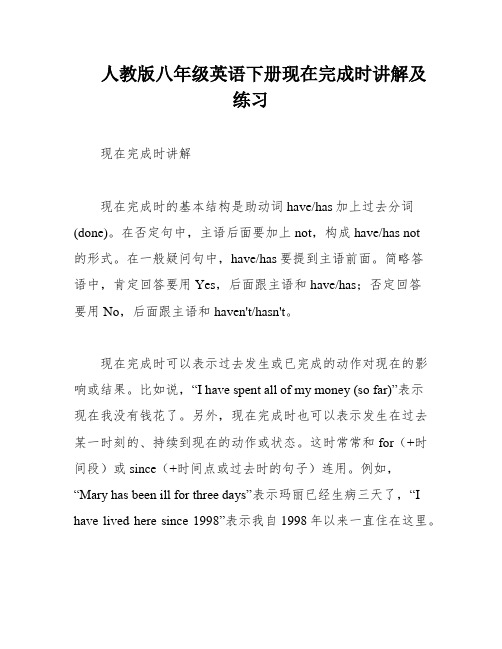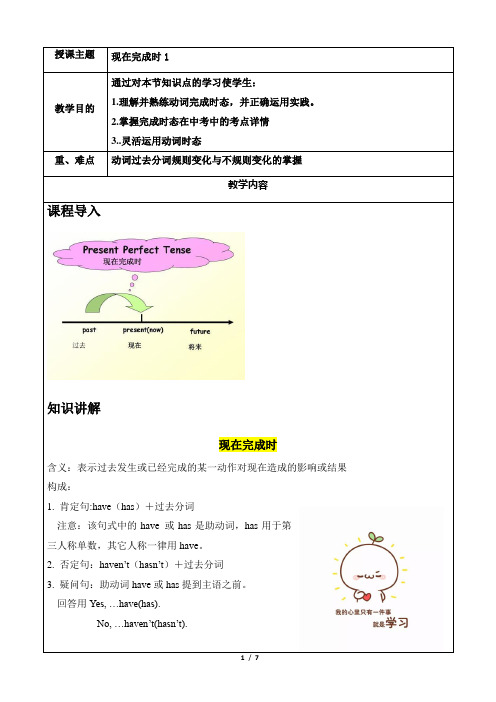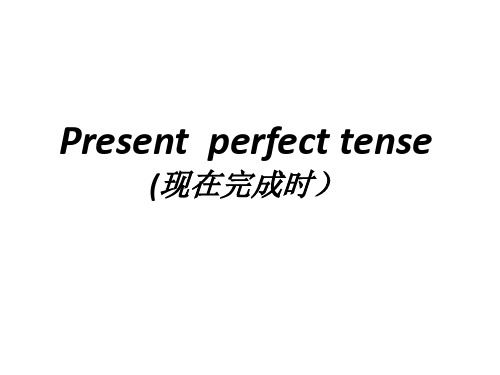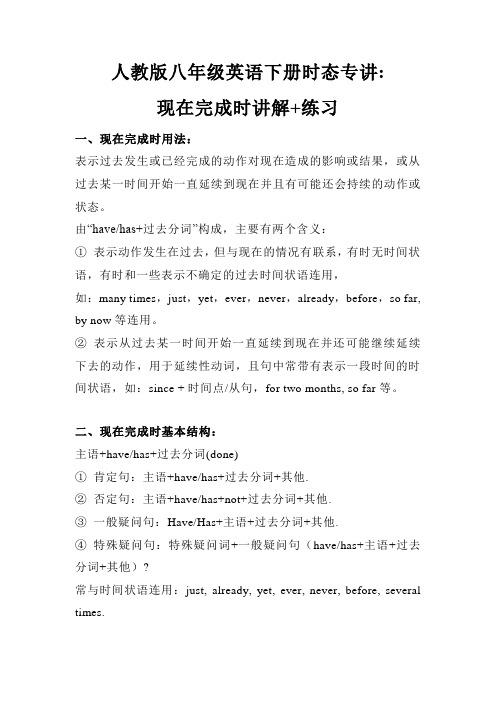人教版八年级下册现在完成时专项讲解
英语人教版八年级下册现在完成时讲解

都用How long
.区分短暂性动词与持续性动词. 表示短暂性(瞬间性)的动词在现在完成时 的句中不能和一段时间连用.即for,since短 语或how long问句
常见非延续性动词和延续性动词的转变
非延续性动词 arrive/come/go to leave/ move become a join start/begin open close go to sleep 延续性动词 be in be away / be out be a be in/ be a member of be on be open be closed be asleep睡着了 sleep睡着了
I have lived here for 11 years. I have lived here since 2000/ 11 years ago. She has learn ed English for 5 years. 她学英语 5年了。 She has learned English since 2007. have/has /+since v过去分词 动词构成: 5 years ago.
• 2.不规则动词
Eg.
go—went—gone see---saw—seen forget—forgot—forgotten run—ran ---- run
现在完成时
1.过去发生的动作对现在造成的影响 或结果。 I’m not hungry now had breakfast
paห้องสมุดไป่ตู้t
now
我已经吃过早饭了。
把下列句子变成否定句。 I have just cleaned my clothes. not He has just had his breakfast. not
人教版八年级英语下册现在完成时讲解及练习

人教版八年级英语下册现在完成时讲解及练习现在完成时讲解现在完成时的基本结构是助动词have/has加上过去分词(done)。
在否定句中,主语后面要加上not,构成have/has not的形式。
在一般疑问句中,have/has要提到主语前面。
简略答语中,肯定回答要用Yes,后面跟主语和have/has;否定回答要用No,后面跟主语和haven't/hasn't。
现在完成时可以表示过去发生或已完成的动作对现在的影响或结果。
比如说,“I have spent all of my money (so far)”表示现在我没有钱花了。
另外,现在完成时也可以表示发生在过去某一时刻的、持续到现在的动作或状态。
这时常常和for(+时间段)或since(+时间点或过去时的句子)连用。
例如,“Mary has been ill for three days”表示玛丽已经生病三天了,“I have lived here since 1998”表示我自1998年以来一直住在这里。
现在完成时还有一些标志词,可以表达过去完成的动作对现在的影响。
这些标志词包括already、just和yet。
例如,“He has al ready got her help”表示他已经得到她的帮助,“He hasn't come back yet”表示他还没有回来。
This is the best film I have ever seen。
I have never seen a better movie before.He has never been to Beijing before。
He has never had the chance to visit Beijing.He says he has been to the USA three times already。
He has had the opportunity to visit the USA on three separate ns.So far。
现在完成时(unit8--unit10知识点总结)人教版英语八年级下册

现在完成时一.定义三要素与构成〔has/have done〕1.表示到现在为止已经完成或刚刚完成的动作。
By now, I have remembered 1000 English words.2.一件发生在过去的事情对现在产生影响。
常见时间状语:常和already〔已经〕,yet〔已经〕,just〔刚刚〕,still〔仍旧〕,so far〔到目前为止〕,till now,(直到现在),before〔以前〕,ever〔曾经〕,3 times(三次),in the past/last..years(在过去几年)I have spent all of my money so far.(1)already:〔已经〕用于确定句位置:放于助动词与done 之间或者放在句末(2)yet:疑问句〔已经〕否认句〔还〕位置:常放句尾(3)ever(曾经):疑问/确定位置:助动词与done之间(4)never〔从不〕位置:助动词与done之间【练习】〔1〕——你吃过早餐了吗?—Have you had breakfast ____?——是的,我已经吃过了。
/不,我还没吃。
—Yes,I have ________ had it./No,I haven’t had it ____.〔2〕I have ______ read this book,so I don’t know what it is about.〔3〕—Have you _____ been to the Great Wall? It’s so wonderful and great.—No,I have ______ been there.3.一个动作开头于过去,并持续到现在〔或许还将持续下去〕。
常见时间状语:①for+一段时间“长达/持续了……②since+过去一个时间点,表示“自从……以来〞时间段+ago,表示“从……以前〞+for+时间段从句〔一般过去时〕eg:Mary has been ill for three days.We have been classmates since 2 years ago.【练习】〔1〕我已经住在这里十年了。
人教版英语八年级下册 Unit8 现在完成时专题讲解 (无答案)

授课主题现在完成时1教学目的通过对本节知识点的学习使学生:1.理解并熟练动词完成时态,并正确运用实践。
2.掌握完成时态在中考中的考点详情3..灵活运用动词时态重、难点动词过去分词规则变化与不规则变化的掌握教学内容课程导入知识讲解现在完成时含义:表示过去发生或已经完成的某一动作对现在造成的影响或结果构成:1. 肯定句:have(has)+过去分词注意:该句式中的have 或has是助动词,has用于第三人称单数,其它人称一律用have。
2. 否定句:ha ven’t(hasn’t)+过去分词3. 疑问句:助动词have或has提到主语之前。
回答用Yes, …have(has).No, …haven’t(hasn’t).(2)表示经历的现在完成时强调过去某一时刻到说话时这段时间中的经历。
Have you ever been to the Great Wall?你去过长城吗?(3)表示延续的现在完成时表示一个动作或状态从过去某时开始,持续到现在,可能要继续下去。
He's loved fishing for a long time.他爱好钓鱼为时已久。
(他现在仍爱好钓鱼)【注意】现在完成时的“未完成”用法既可用于动态动词(主要是持续动词),也可用于状态动词,但一般不用于表短暂动作或位置转移的动词,如:open, break, go, come, arrive, leave 如用这类动词表示“未完成”,通常只限于否定结构。
I haven't seen a film for weeks.我已经好几个星期没看电影了。
3、现在完成时的时间状语(1)与现在完成时“已完成”用法连用的时间状语①不确定的过去时间状语:already, yet, before, recently, lately等I've seen the film before.我以前看过这部电影。
②频度时间状语:often, sometimes, ever, never, once, rarely等We have never heard of that.我们从未听说过这事。
人教版八年级英语下册Unit10 SectionA 现在完成时态专项讲解 课件

这本书我借了一个月了。
I borrowed this book a month ago. I have kept the book for a month. /since a month ago.
It is/ has been a month since I borrowed the book. A month has passed since I borrowed the book.
用法二 表示过去某个时间开始的动 作或存在的状态,一直持续 到现在并可能还将持续下去。 动词使用延续性动词。常与 for或since引导的时间连用.
for+时间段 since+过去的时间点 since+句子(过去时)
Kate has lived here for 3 years. Kate has lived here since 3 years ago. Kate has lived here since she came to China.
Exercises 1.His father has died. (for 2 years)
His father has been dead for 2 years. 2.The football match has begun.(since9:00a.m) The football match has been on since 9:00 a.m. 3.They have joined the army. (since they were 18 years old) They have been in the army since they were 18 years old. 4.My teacher has just left Nanjing. (for 3 days) My teacher has just been away from Nanjing Where is Tom?
人教版八年级英语下册时态专讲-现在完成时讲解+练习

人教版八年级英语下册时态专讲:现在完成时讲解+练习一、现在完成时用法:表示过去发生或已经完成的动作对现在造成的影响或结果,或从过去某一时间开始一直延续到现在并且有可能还会持续的动作或状态。
由“have/has+过去分词”构成,主要有两个含义:①表示动作发生在过去,但与现在的情况有联系,有时无时间状语,有时和一些表示不确定的过去时间状语连用,如:many times,just,yet,ever,never,already,before,so far, by now等连用。
②表示从过去某一时间开始一直延续到现在并还可能继续延续下去的动作,用于延续性动词,且句中常带有表示一段时间的时间状语,如:since + 时间点/从句,for two months, so far等。
二、现在完成时基本结构:主语+have/has+过去分词(done)①肯定句:主语+have/has+过去分词+其他.②否定句:主语+have/has+not+过去分词+其他.③一般疑问句:Have/Has+主语+过去分词+其他.④特殊疑问句:特殊疑问词+一般疑问句(have/has+主语+过去分词+其他)?常与时间状语连用:just, already, yet, ever, never, before, several times.Already: “已经”; yet“仍然, 还”,这两个副词常常用于完成时态, 其中already常用于肯定句, yet常用于否定句和疑问句中。
如: Jim has already finished his work. Jim已经把他的工作做完了。
Mother hasn’t come home yet. 妈妈还没回来。
三、现在完成时一般过去时的区别:现在完成时表示的是与现在有关联的过去事件;而一般过去时则与现在毫无关系,只是单纯的过去的情况。
比较:I have lost my pen, so I have to buy one.我丢了钢笔,所以得去买一枝。
人教新目标英语八年级下册 Unit8 SectionA 现在完成时态专项讲解
4.你们 学过这个单词吗? Have you learned the word?
规则动词的过去式
1.一般情况下,在动词原形后面加-ed
look→looked play→played start→started
visit→visited pull-pulled, cook-cooked 2.以不发音e结尾的动词,在词尾直接加-d
-ay -aid
-aid
say,pay,lay
-n
-nt
-nt
burn,learn,mean
-ee- -e-
-e-
meet,feed
-ought -ought bring,buy,fight,think
-aught -aught
catch,teach
ABB
keep-kept-kept sweep-swept-swept sleep-slept-slept
hang-hung (hanged)-hung (hanged)
ABC
原型 过去式 过去分
例词
词
-eak -oke -oken
break,speak
-eal -ole -olen
steal
-ear -ore -orn
wear,bear,tear
-ow -ew -own (aw)
grow,blow,know, throw,draw
1.Lucy 还没参观过长城。
Lucy hasn’t visited the Great Wall. 2.我们 还没谈论这件事。 We haven’t talked about the thing. 3.我还没完成这个工作。 I haven’t finished the work.
人教版八年级英语下册现在完成时讲解及练习
现在完成时讲解一.基本结构:助动词have/has+过去分词(done)二.句型:否定句:主语+have/has+not+过去分词+其他.一般疑问句:Have/Has+主语+过去分词+其他.简略答语:Yes,主语+have/has.(肯定)No,主语+haven't/hasn't.(否定)三.用法(1)现在完成时表示过去发生或已经完成的动作对现在造成的影响或结果I have spent all of my money(so far).(含义是:现在我没有钱花了.)Guo zijun has(just/already)come.(含义:郭子君现在在这儿)My father has gone to work.(含义是:我爸爸现在不在这儿)(2)现在完成时可以用来表示发生在过去某一时刻的,持续到现在的动作(用行为动词表示)或状态(be动词表示)常与for(+时间段),since(+时间点或过去时的句子)连用.①f or+时段②s ince+过去一个时间点(译为:自从……以来)③s ince+时段+ago④s ince+从句(过去时)●⑤I t is+时段+since+从句(过去时)Mary has been ill for three days.I have lived here since1998.四.has gone(to),has been(to),has been(in)的区别Have/Has gone(to):去了(现在不在说话现场)Where is your father?H e has gone to Shanghai.Have/Has been(to):去过(已不在去过的地方)My father has been to Shanghai.Have/has been in:呆了多久(还在所呆的地方)My father has been in Shanghai for two months./sin ce two months ago.五.现在完成时的标志1.现在完成时的含义之一是过去完成的动作对现在仍有影响,用以下四大标志词可以表达这种含义:*以already,just和yet为标志He has already got her help.他已得到她的帮助。
人教版英语八年级下册Unit9现在完成时优秀教学案例
1.培养学生对英语学习的兴趣,激发学生积极思考和主动参与的热情。
2.帮助学生建立自信心,鼓励学生大胆开口说英语,不怕犯错误。
3.培养学生关爱他人、尊重他人的价值观,通过小组合作和课堂展示,让学生学会倾听、理解和接纳他人的观点。
4.实、表达情感的能力。
二、教学目标
(一)知识与技能
1.让学生掌握现在完成时的结构:主语+ have/has +过去分词。
2.让学生了解现在完成时的基本用法,包括表示过去发生的动作对现在造成的影响或结果,以及表示过去发生的动作到现在为止的时间范围。
3.让学生能够运用现在完成时描述自己的经历、表达观点和询问信息。
4.让学生学会使用现在完成时进行比较和顺序排列。
4.反思与评价:通过反思与评价的环节,让学生对自己的学习进行思考和总结,培养他们的自我反思和自我评价能力。同时,学生之间的互相评价和教师对学生的评价也能够帮助学生了解自己的不足之处,进一步提高自己的学习能力。
5.教学策略的灵活运用:通过情景创设、问题导向、小组合作和反思与评价等多种教学策略的灵活运用,使得整个教学过程丰富多样,充满活力。这种多样化的教学策略不仅能够满足不同学生的学习需求,还能够激发学生的学习兴趣和动力,提高他们的学习效果和成就感。
3.设计一些开放性问题,激发学生运用现在完成时表达自己的观点和看法,例如:“你认为现在完成时在日常生活中的应用场景有哪些?”“你如何看待现在完成时在英语交际中的重要性?”
(三)小组合作
1.将学生分成小组,每组选择一个主题,如家庭、学校、朋友等,运用现在完成时进行讨论,总结每个人在小组主题方面的经历和感受。
2.教师设计一些问题,引导学生运用现在完成时进行思考和讨论,如:“Can you describe an unforgettable experience you had with your family?”、“Have you ever been to a foreign country?”等。
人教版八年级英语下册现在完成时态讲解和练习
现在完成时态讲解和练习一、结构现在完成时态由“助动词have/ has+过去分词” 构成陈述句I have lost my pen.否定句I haven’t (have not)lost my pen.一般疑问句Have you lost your pen? Yes, I have. / No, I haven’t.特殊疑问句I have lost my pen. (提问) What have you lost?选择疑问句Have y ou lost your pen or pencil?过去分词变化:(1)与过去式一样:直去双改(2)不规则:AAA ABB ABA ABC AABbuy-bought-bought make-made-made read-read-read write-wrote-written beat-beat-beaten become-became-become 二、基本用法:(一)表示过去的动作或状态对现在造成的影响或结果。
如:(1)He has come 他来了(他现在在这儿)(2)He has turned on the light 他已经把灯打开了(房间是亮的)(3)She has learned to skate 她学过滑冰(她现在会滑冰)(4)He has been to Armenia 他去过美国(他现在不在那里,但知道那里的情况)✧考点探究:1、对这种用法的考查,主要考查学生对现在完成时态的判断。
这种用法强调过去动作对现在造成的影响,因此,在题干中常用一般现在时态或一般将来时态的句子来说明这种影响或结果。
(口诀:前后两句呈因果,必用现在完成时)如:(1)I ___________ (spend) all the money, so I have to walk home.答案为have spent. 花光钱是过去的动作,但对现在造成了影响,“我现在必须得步行回家”。
- 1、下载文档前请自行甄别文档内容的完整性,平台不提供额外的编辑、内容补充、找答案等附加服务。
- 2、"仅部分预览"的文档,不可在线预览部分如存在完整性等问题,可反馈申请退款(可完整预览的文档不适用该条件!)。
- 3、如文档侵犯您的权益,请联系客服反馈,我们会尽快为您处理(人工客服工作时间:9:00-18:30)。
现在完成时现在完成时(present perfect tense)通常表示过去发生的动作一直延续到现在,而且还可能继续下去,或者表示过去的行为对现在造成一定的影响,可能还会产生结果等。
1.现在完成时结构1.1.助动词have/has+动词过去分词。
其中,助动词要随着主语的变化而变化,当主语是第三人称单数时,助动词要用“has”。
例:Have you finished your work?He says that he has seen UFOs many times.1.2.现在完成时的缩写形式:I have=I ’ve have not= haven’thas not= hasn’t例:I’ve finished my work./He hasn’t finished his work.1.3.现在完成时的一般疑问句:Have/Has+主语+动词的过去分词+其他?肯定回答:Yes,主语+have/has.否定回答:No,主语+haven’t/hasn’t.例:----Have you finished your work?----Yes,I have./No,l haven’t.----Have they arrived?----Yes,they have./No,they haven’t. 1.4.1.通过加-ed的形式来构成规则动词的过去分词,就像我们构成这些动词的过去式方法一样。
大多数动词后+ed.如finish---finished.以字母e为结尾的动词后+d,如change---changed.以辅音字母加y结尾的动词,去掉y,再加ied.如carry---carried.以一个元音再加一个辅音结尾的短动词,双写辅音辅音字母再加ed.如stop---stopped1.4.2.构成不规则动词的过去分词的方法有所不同,需要特别记忆。
如:come---come; hurt---hurt. lend---lent; build---builtcatch---caught; keep---kept forget---forgotten tell---toldbe---been; have---had fall---fallen; fly---flowndraw---drawn; see---seen;think---thought.2.现在完成时的用法2.1.表示过去发生或已经完成的动作,对现在造成的影响或结果。
通常与表示时间的词汇连用,常见的有“already, yet, ever, just, recently, since, for. lately”Justin has disappeared for three days, so Kelly is very sad.I have just finished my homework.2.2.表示过去已经开始持续到现在,也许还会持续下去的动作或状态。
可以和表示从过去某一时刻延续到现在(包括现在)的一段状语连用,如“for,since, so far, now, today, this week, this month”。
如:She has lived in Beijing since she moved in China.I have known her for a long time.2.3.一般现在时可用于重复的行为中,表示到现在为止这一段时间内,多次动作总和或所做过的工作量的积累。
如:I have been to Shanghai twice.I have mopped the floor three times today.3.注意现在完成时和一般过去时的区别。
现在完成时表示到说话时为止已经发生或完成的动作或状态,强调造成的结果或对现在的影响;而一般过去时侧重于陈述过去发生的事情或状态,与现在没关系。
例:He has just been to British and saw the Big Ben there.经常与一般过去时连用的表示时间的词语有“yesterday ,theother day, last…, ago…”;与现在完成时常用的表示时间的词语有“already, ever, just, recently (not)yet, since等。
”例:He went to Beijing two years ago.(一般过去时)He has already lived in Beijing for two years.(现在进行时)练习:用现在完成时和一般过去时完成下列句子1.We ____(go)to the park last month.2.___you ever ___(try)the famous Beijing Duck?3.I am happy that I___(learn)to swim.4.I ___ (visit)the Great Wall with my parents the other day.4.现在完成时中have/has been 和have/has gone的用法。
have/has been t o用来表达某人去了一个地方并且已经回来了,指的是一次经历;have/has gone用来表达某人去了一个地方,但是还没回来。
例:Millie and Amy have been to the South Hill and they want to go there again.(米莉和艾米去过南山,而且她们还想再去那里)Millie and Amy have gone to the South Hill and they will come back tomorrow.(米莉和艾米去了南山,她们将明天回来。
)练习:用have/has been 或have/has gone 填空。
1.Sandy isn’t here,she___to the library.2.I ___just___to the library and borrowed some interesting books.3.My cousin ___to Xi’an twice.4.My cousin ___to Xi’an and he will stay there for a week.5.与for和since连用的动词现在完成时常与for或since等引导的表示一段时间的状连用.如for ten minutes,since 1985等.“for+时间段”强调这一段时间的长度。
“since+时间点(或一个从句)”强调这一段时间的起点。
(1).在现在完成时的肯定句中,和for与since连用的谓语动词要用延续性动词,如work,be,study,liveHe has studied English since two years ago.(2).某些非延续性动词的否定形式可以与for或since等时间状语连用。
Haven’t seen you for a long time.(3)一些延续性动词和非延续性动词的转换现在完成时综合练习1.()----Have you eaten my food,Andy?---- No,I ___.A.haveB.haven’tC.hasD.has’t2.()Our country ___ a lot since 1978. Now, it’s much stronger.A.is changedB.changedC.has changedD.changes3.()I ___ her for many years, so I can’t remember her name.A.haven’t seenB.have seenC.didn’t seeD.see4.()Simon has ___fed the dog, but he hasn’t watered the plants.A.still,alreadyB.yet,alreadyC.yet,stillD.already,yet5.()----Why doesn’t Tony come?----The invitation letter ___to Toby by accident.A.was emailedB.has emailedC.is emailedD.emailed6.()----Mom,I want to watch T he Legend of Miyue on channal 8 tonight.----Oh,dear, it ___for a few e on!A.has begunB.will beginC.has been onD.will be on7.()----Peter, you speak Chinese so well.----Thank you.I___Chinese since I came here in 2013.A.will learnB.learnedC.have learnedD.learn8.()----What a nice watch!How long ___ you ___ it?----For just two weeks.A.will,buyB.have,hadC.were,havingD.did,buy9.()----Will you watch the programme Running Man in Zhejiang Satellite-TV tonight.----Yes, of course.It__one of the most popular shows since last October.A.wasB.becameC.has beenD.has become10.()----What age did you leave home?---- I left home at 18,Neil. I___ your city for five years.A.have gone toB.have been toC.have been inD.have come to11.()Mike used to be a top student,but he _____behind since he lost himself in computer games.A.fellB.has fallenC.wasD.has been12.()-----______you _____Jeremy Shu-How Lin?-----Yes.The once nameless young man became a basketball hero suddenly.A.Did,hearB.Do,listen toC.Have, heard ofD.Have,listen to。
